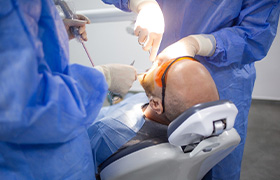Tooth Extractions – New Bedford, MA
Safe. Effective. Painless

If it were left up to us, our patients would keep all of their natural teeth for their entire lives. Unfortunately, in cases of severe dental decay or damage, an extraction is sometimes the best choice to protect and preserve a patient’s oral health. Using a combination of local anesthetic and a gentle touch, most patients don’t even feel it when their tooth actually comes out! Afterward, if necessary, we can help patients quickly replace their tooth so that any time spent with an incomplete smile is kept to a minimum. To learn more about extractions and find out if you might need one, give us a call today.
Why Choose Clear Coast Dental for Tooth Extraction?
- Patient comfort is priority #1
- Local anesthetic guarantees a painless procedure
- 30+ year history of serving New Bedford
Reasons Why Tooth Extractions Are Necessary

At Clear Coast Dental, our team of experts works hard to provide alternative solutions that are designed to help keep teeth firmly in place, even if they sustain damage or decay. However, when situations arise that cannot be treated using other forms of dental care, the only option may be to extract the tooth.
We may recommend tooth extraction if any of the following situations arise:
- You need orthodontic treatment but are dealing with overcrowding and need one or more teeth removed.
- You have severe decay that is spreading to nearby teeth, putting them at risk.
- You are suffering from advanced gum disease, and it is causing your teeth to become loose.
- You’ve suffered serious facial trauma.
- You need dentures; however, your existing natural teeth are likely to fall out and need to be removed.
- You have a child whose baby teeth will not fall out on their own, so extraction can help to ensure proper eruption of their permanent teeth.
The Process of Removing a Tooth

Your dentist will go over the details with you during your initial consultation, but the removal process of a tooth can occur simply or surgically. It is ultimately based on the status of your tooth and how easy it is to remove.
If you have a tooth that is partially or fully erupted, a simple process can ensue that involves using dental elevators. This brings the tooth up and away from the ligaments holding it in place. Using dental forceps, we’ll gently rock it back and forth until it lets go.
However, if the tooth is impacted, it will need to be removed surgically, which requires a more invasive procedure. Using sterilized, specialized instruments, we will make an incision in your gums so that we can gain access to it. We’ll likely remove the tooth in sections, as this prevents further harm to the bone.
You do not need to worry, though, as we will administer local anesthesia before we start.
Tooth Extraction Aftercare

It’s important that you take special care of your smile after the extraction process is complete. Your mouth will need to fully heal, so make sure that you keep the following tips in mind:
- Get plenty of rest when returning home after your procedure.
- Change out the gauze to help cease the bleeding.
- Use an ice pack to cease any swelling or discomfort.
- Elevate your head while resting so that blood does not rush toward this area of your body and cause further bleeding.
- Rinse with a warm saltwater mixture to encourage faster healing.
- Avoid straws, as you may suffer a dry socket if you accidentally dislodge your blood clot(s).
- Avoid smoking or drinking alcohol as well as eating hard, crunchy foods during the first several days.
- Stick to softer foods to avoid additional pressure on these areas of your mouth.
Understanding the Cost of Tooth Extractions

The cost of tooth extractions can vary depending on several factors. After you visit us and we can evaluate the situation, we will be able to discuss specific numbers with you. In most cases, the extraction procedure is fairly affordable. Our practice welcomes insurance, and we have an in-house discount plan to help you save money. We also offer financing through CareCredit. We want to do everything we can to minimize the stress of paying for necessary treatment.
Factors That Can Affect Tooth Extraction Cost

Some factors that can have a bearing on the cost of tooth extractions include:
- The specific tooth that needs to be removed. Some teeth are more challenging to remove than others. Therefore, they incur higher fees. For example, removing the back teeth may cost more because they are larger and more difficult to reach.
- The number of teeth that should be extracted. Logically, it costs more to remove several teeth than it does to remove just one or two.
- The complexity of your case. We can perform most tooth extractions right here at Clear Coast Dental. However, if there are complicating factors in your case, we may need to refer you to a specialist whose pricing structure is different from our own.
- Additional care. Tooth replacement after an extraction can add significantly to the total cost of your care. The type of tooth replacement you choose may cost anywhere from several hundred dollars to thousands of dollars.
Does Dental Insurance Cover Tooth Extractions?

Dental insurance usually does cover the cost of extractions. If the procedure is fairly simple, it may be classified as a minor service, so up to 80% of the price may be covered. More complex extractions might be 50% covered. Of course, policies can vary greatly, so you should check the details of your plan to learn how it works. Our team welcomes insurance, and we will do all we can to help you confirm your benefits and use them in the most advantageous way possible.
Other Options for Making Tooth Extractions Affordable

In addition to insurance, there are a few provisions that might make it easier for you to afford your extraction procedure:
- The Clear Coast membership plan covers all of your preventive care, and it provides a discount on all other services performed in our practice, including tooth extractions. It is designed specifically for patients without insurance, and its price is very affordable for most people.
- We accept financing through CareCredit, a third-party company that provides low-interest payment plans for dental services. The application process is fast, and most patients are quickly approved for credit.
Would you like to learn more about tooth extractions and their cost? Our team is ready to answer your questions. Get in touch with us today to book a consultation.
Tooth Extractions FAQs

What’s the Difference Between Tooth Extractions and Wisdom Tooth Surgery?
While both involve removing a problematic tooth, there are serious distinctions between tooth extractions and wisdom tooth surgery. This is because removing wisdom teeth is typically a more involved process. Wisdom teeth are more likely to be impacted than other teeth, which means that it’s often necessary to go below the gumline in order to remove them. This is why wisdom tooth ”surgery” is called that.
Can I Leave the Space Empty After a Tooth Extraction?
Often when patients have a tooth at the back of their mouth removed, they’re tempted to just leave the space empty. However, even if people can’t see a missing tooth, that doesn’t mean that having a gap in your smile can’t cause problems.
For one, even missing a single tooth can impair your ability to chew food effectively. Grinding up food begins the process of digestion, and if you can’t do that as well as you could before, the odds are that you aren’t getting as many nutrients from your food as you could be. You may also find that speaking is much more difficult than it was before, even if you’re missing just a single tooth.
For these reasons, it’s critically important that you replace any tooth that has been removed with a dental bridge, dental implant, or denture.
Can I Smoke After Getting a Tooth Extracted?
Tobacco and nicotine products of all kinds restrict blood flow to the mouth, which delays the healing process. The suction involved in smoking and vaping can also pull the emerging clot in your mouth out of place and can lead to an uncomfortable condition known as dry socket.
For these reasons, we would strongly recommend that you abstain from smoking for anywhere from one to two weeks after your tooth extraction. If you’ve struggled to quit in the past, talk to us and we’ll discover methods that could help you.
What Can I Do to Speed Up the Healing Time?
While your body will do a lot of the work of healing for you, there are a few things you can do to make the process of recovery easier:
- Keep your gauze in place, and avoid touching the wound to allow the clot to form.
- Avoid anything that could irritate the wound, including mouthwash and acidic foods.
- Avoid dry socket. Don’t use a straw, spit excessively, or do anything else that could create suction in the mouth.
- Place an icepack on your cheek to bring down swelling.

